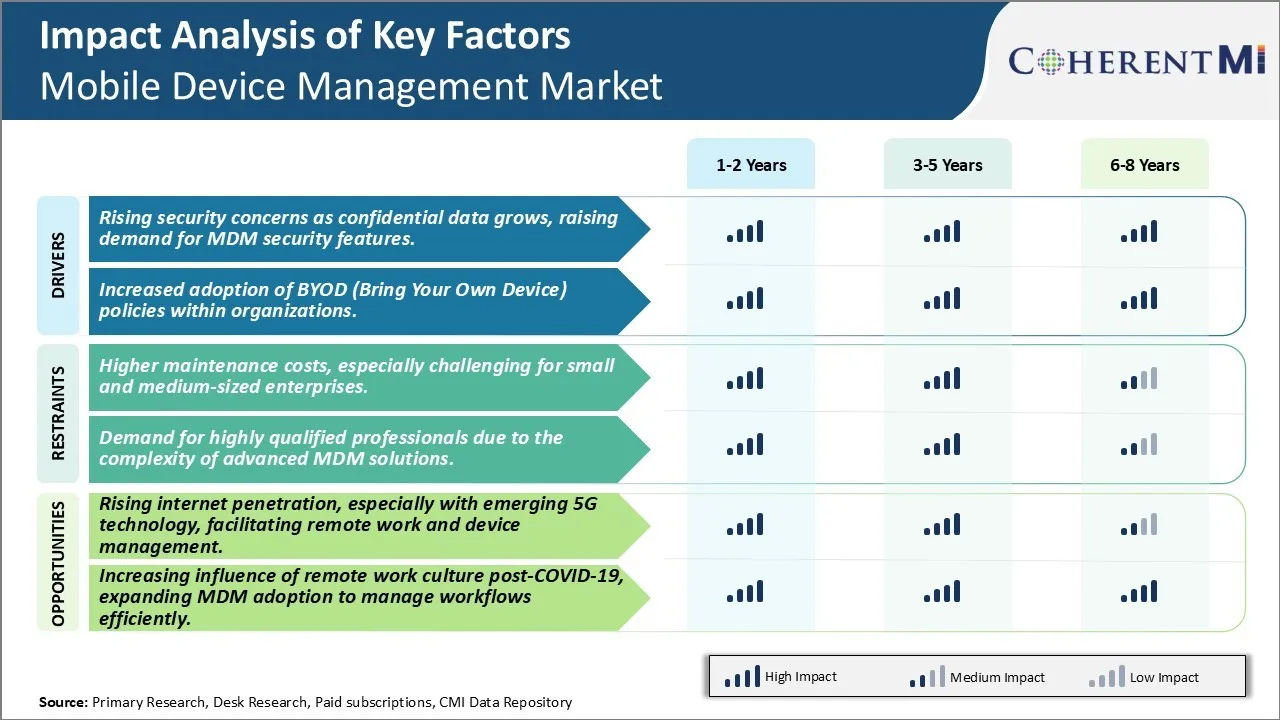Mobile Device Management Market Trends
Market Driver - Rising security concerns as confidential data grows, raising demand for MDM security features.
As organizations collect and store more confidential data on mobile devices, security has become a top priority for businesses. In today's highly connected world, mobile devices have quickly become an integral part of business operations allowing employees to access organizational resources from anywhere. However, this has also increased the attack surface for cybercriminals. With sensitive data related to customers, employees and organizational processes residing on mobile devices, the risk of data breaches has grown manifold. A single compromised device can potentially expose confidential information to unauthorized access putting an organization's reputation and compliance at stake.
Moreover, many employees also use their mobile devices for personal tasks in addition to work. This often leads to insecure behaviors like downloading apps from unknown sources, not installing updates or falling for phishing attacks. As mobile malware becomes more sophisticated, it poses a serious threat to any connected device. This has made complete security control over company-owned and employee-owned devices crucial for businesses. Mobile Device Management platforms address these security challenges through features that enable organizations enforce password policies, install security updates, remotely wipe devices if lost or stolen and segregate personal and work data and apps.
With centralized visibility and control, IT teams can now monitor enrolled devices, detect intrusions and respond quickly if any anomalous activity is noticed. The growing security concerns regarding leakage of sensitive data from mobile devices have significantly driven adoption of MDM to govern device usage as well as enable centralized security management and oversight.
Market Driver - Increased Adoption of BYOD (Bring Your Own Device) Policies Within Organizations
Organizations globally have seen an immense growth in popularity and uptake of BYOD policies as both employees and employers recognize its benefits. Allowing staff to use their personal smartphones and tablets for work tasks increases employee flexibility, boosts productivity and morale. It also helps attract new talent as the younger workforce expects to be able to use devices of their choice. At the same time, employers see cost savings from supporting fewer company-owned devices. However, BYOD raises serious security challenges as employee-owned devices lack centralized security enforcement leaving organizations susceptible to data leakage.
With BYOD, organizations need to grant secure access to corporate applications and data on devices that they do not physically control. Mobile Device Management emerges as the best way to extend security policies to unmanaged devices. IT administrators can use MDM platforms to securely enroll BYOD devices, configure necessary settings, install security profiles and segregate personal and professional data through containerization techniques. Through features like remote locking and wiping, MDM allows businesses to retain control over corporate assets even on employee personal devices. Centralized monitoring and audit functionalities also help address compliance needs around data security and privacy expectations.

Market Challenge - Higher Maintenance Costs, Especially Challenging for Small and Medium-Sized Enterprises
One of the key challenges for the Mobile Device Management (MDM) market is the higher maintenance costs, especially for small and medium-sized enterprises. As mobile devices have become ubiquitous in the workplace, the number of devices that need to be managed has increased exponentially. This brings with it rising costs associated with licensing, support, security updates and troubleshooting across a growing fleet of heterogeneous devices. While large enterprises have the economies of scale to absorb these expenses more easily, it poses a significant burden on SMEs with more limited budgets. The diverse nature of BYOD policies also adds complexity in ensuring compliance and privacy across personal and company-owned devices. With costs mounting without necessarily gaining scale benefits, small businesses may hesitate to adopt comprehensive MDM solutions, preferring lighter or do-it-yourself approaches instead. Vendors will need to innovate new pricing models tailored for the needs of mid-market customers to drive further adoption in this segment.
Market Opportunity- Rising Internet Penetration and Emerging 5G to Create Immense Technological Opportunities
One major opportunity for the Mobile Device Management market is the rising internet penetration globally, facilitated by emerging technologies such as 5G. As high-speed connectivity becomes more widely available, it will enable new forms of remote and flexible work arrangements that rely heavily on mobile access. This drives the need for centralized device management across distributed locations and BYOD environments. 5G capabilities like network slicing also facilitate secure segmentation of work and personal applications on mobile devices. The COVID-19 pandemic highlighted the importance of remote manageability of endpoints, further accelerating digital transformation journeys. These trends point to growing demand for robust yet easy to deploy MDM solutions that can keep a dispersed workforce and their devices secure, compliant and productive regardless of location. Vendors poised to leverage high-speed low latency 5G networks will be well placed to tap into this opportunity.